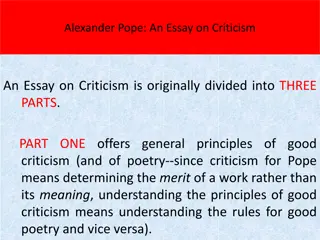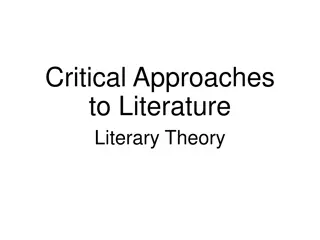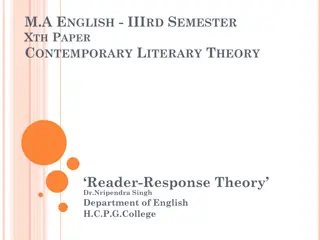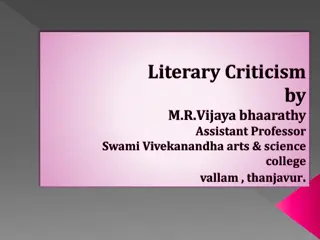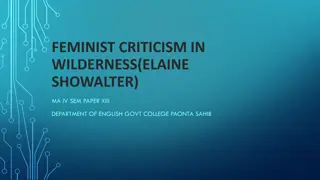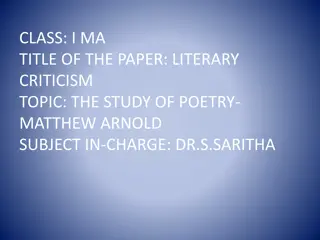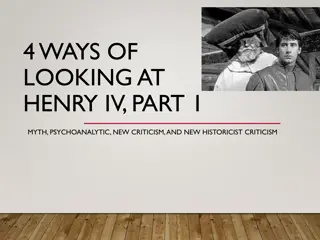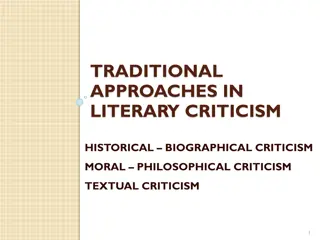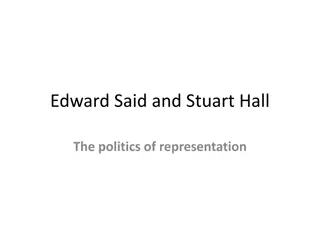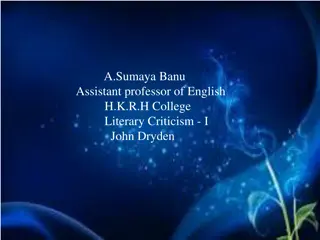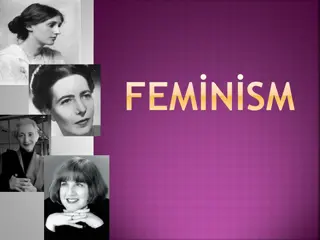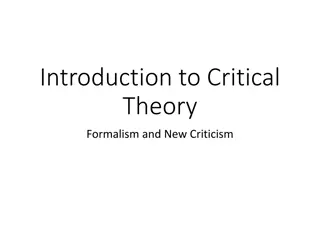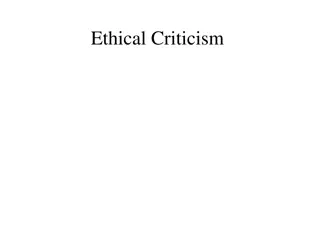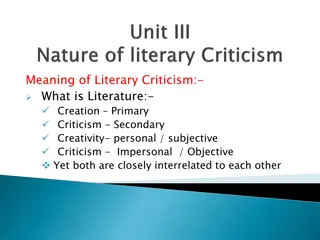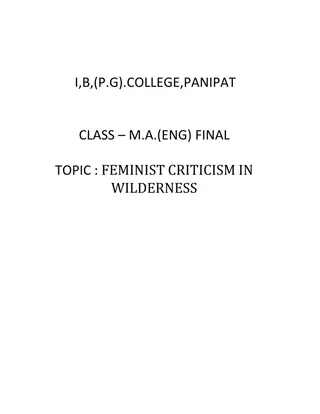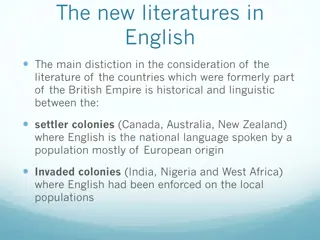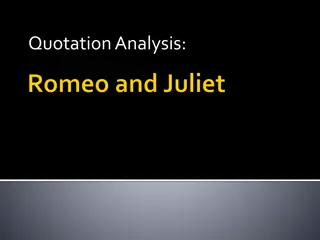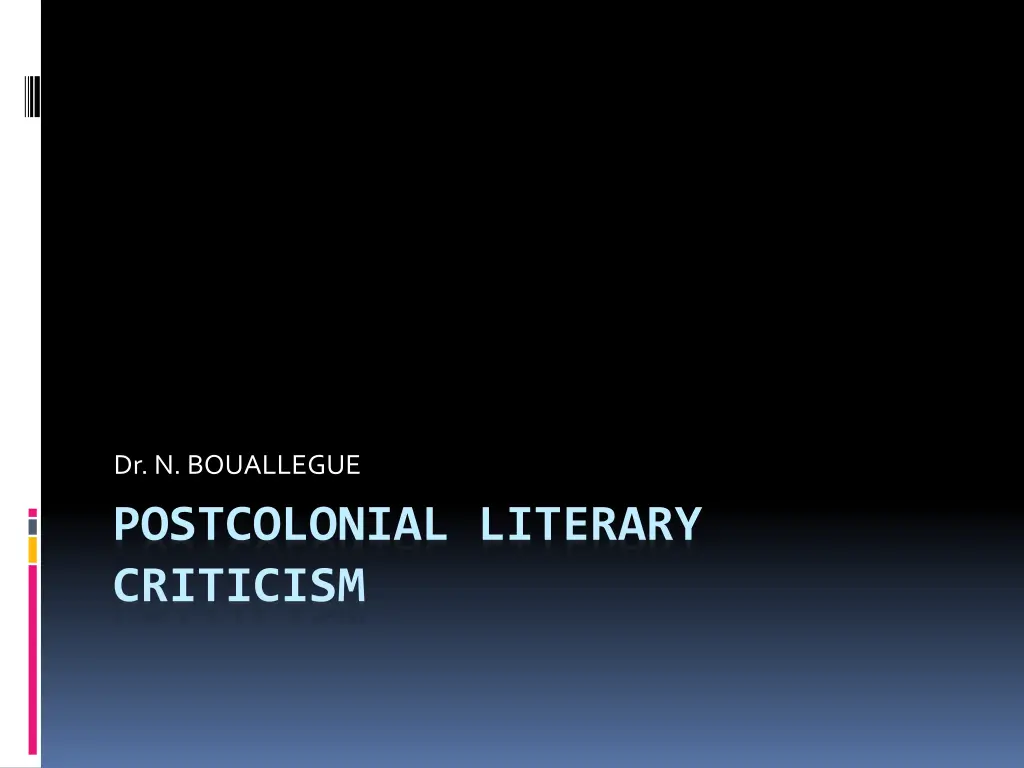
Postcolonial Literary Criticism Overview
Dive into the world of postcolonial literary criticism, exploring the history, major texts, and aims of this critical approach focused on analyzing literary works from formerly colonized countries and cultures. Discover how postcolonial theory reexamines colonialism's impact and advocates for political liberation and cultural identity.
Download Presentation

Please find below an Image/Link to download the presentation.
The content on the website is provided AS IS for your information and personal use only. It may not be sold, licensed, or shared on other websites without obtaining consent from the author. If you encounter any issues during the download, it is possible that the publisher has removed the file from their server.
You are allowed to download the files provided on this website for personal or commercial use, subject to the condition that they are used lawfully. All files are the property of their respective owners.
The content on the website is provided AS IS for your information and personal use only. It may not be sold, licensed, or shared on other websites without obtaining consent from the author.
E N D
Presentation Transcript
Dr. N. BOUALLEGUE POSTCOLONIAL LITERARY CRITICISM
Introduction Postcolonial literary criticism is an approach to literature that focuses on the study of literary texts produced in countries and cultures that were subject to European colonial powers. It can also refer to the analysis of texts written about colonized places and people by writers of the colonizing culture. Postcolonial literature and criticism arose both during and after the struggles of many nations in Africa, Asia, Latin America and elsewhere for independence from colonial rule.
Major Postcolonial Texts The year 1950 saw the publication of seminal texts of postcolonialism: Aim C saire s Discours sur le colonialisme, and Frantz Fanon s Black Skin, White Masks. And in 1958 Chinua Achebepublished his novel Things Fall Apart. According to the critic Robert Young, the founding moment of postcolonial theory was the journal the Tricontinental, launched by the Havan Tricontinental of 1966, which initiated the first global alliance of the peoples of the three continents [Africa, Asia, Latin America] against imperialism . Edward Said s landmark work Orientalism appeared in 1978.
The term postcolonialism Robert Young sees postcolonialism as continuing to derive its inspiration from the anti-colonial struggles of the colonial era. Ashcroft, Griffiths, and Tiffin also use the term postcolonial in a comprehensive sense, to cover all the culture affected by the imperial process from the moment of colonization to the present day, on account of the continuity of preoccupations between the colonial and postcolonial periods.
Aims of Postcolonial theory Postcolonial criticism , Young argues, has embraced a number of aims: most fundamentally, to reexamine the history of colonialism from the perspective of the colonized; to determine the economic, political, and cultural impact of colonialism on both the colonized peoples and the colonizing powers; to analyze the process of decolonization; and above all, to participate in the goals of political liberation, which includes equal access to material resources, the contestation of forms of domination, and the articulation of political and cultural identities .
Internal colonization Postcolonial discourse potentially embraces, and is intimately linked with, a broad range of dialogues within the colonizing powers, addressing various forms of internal colonization as treated by minority studiesof various kinds such as African- American, Native American, Latin American, and Asian American. All of these discourses have challenged the main streams of Western philosophy, literature, and ideology. This challenge is revealed in the questioning and revaluation of the literary and cultural canon in Western institutions, through what is called multiculturalism.
Multicultural literature Multicultural literature is defined as writing in English about North American ethnic, cultural and religious minority groups .It signifies texts carrying in one way or another images of migrant experiences. Minority groups want to have a voice through developing a unique artistic style as a defense mechanism in opposition to the dominant culture.
Key concepts in postcolonial theory
APPROPRIATION: A term used to describe the ways in which post- colonial societies take over those aspects of the imperial culture language, forms of writing, film, theatre, even modes of thought and argument such as rationalism, logic and analysis that may be of use to them in articulating their own social and cultural identities. This process is sometimes used to describe the strategy by which the dominant imperial power incorporates as its own the territory or culture that it surveys and invades. However, post-colonial theory focuses instead on an exploration of the ways in which the dominated or colonized culture can use the tools of the dominant discourse to resist its political or cultural control.
DISLOCATION: A term for both the occasion of displacement that occurs as a result of imperial occupation and the experiences associated with this event. The phenomenon may be a result of transportation from one country to another by slavery or imprisonment, by invasion and settlement, a consequence of willing or unwilling movement from a known to an unknown location. Besides the geographical dislocation, postcolonial subjects can also endure a cultural dislocation. They are metaphorically dislocated, placed into a hierarchy that sets their culture aside and ignores its institutions and values in favor of the values and practices of the colonizing culture.
ETHNICITY: It is a term that has been used increasingly since the 1960s to account for human variation in terms of culture, tradition, language, social patterns and ancestry, rather than the discredited generalizations of race with its assumption of a humanity divided into fixed, genetically determined biological types. Ethnicity refers to the fusion of many traits that belong to the nature of any ethnic group: a composite of shared values, beliefs, norms, tastes, behaviors, experiences, consciousness of kind, memories and loyalties.
HYBRIDITY : The term hybridity has been most recently associated with the work of Homi K.Bhabha, whose analysis of colonizer/colonized relations stresses their interdependence and the mutual construction of their subjectivities. Bhabha contends that all cultural statements and systems are constructed in a space that he calls the Third Space of enunciation . Hybridity has frequently been used in post-colonial discourse to mean simply cross-cultural exchange . This use of the term has been widely criticized. The criticism of the term stems from the perception of theories which believe that mutuality necessarily downplay opposition, and increase continuing post- colonial dependence.
LIMINALITY: : The importance of the liminal for post-colonial theory is precisely its usefulness for describing an in- between space in which cultural change may occur: the transcultural space in which strategies for personal or communal self-hood may be elaborated, a region in which there is a continual process of movement and interchange between different states. For instance, the colonized subject may dwell in the liminal space between colonial discourse and the assumption of a new noncolonial identity. But such identification is never simply a movement from one identity to another; it is a constant process of engagement, and appropriation.
THE OTHER: In general terms, the other is anyone who is separate from one s self. The existence of others is crucial in defining what is normal and in locating one s own place in the world. The colonized subject is characterized as other through discourses such as primitivism and cannibalism, as a means of establishing the binary separation of the colonizer and colonized and asserting the naturalness and primacy of the colonizing culture and world view. It refers to the colonized others who are marginalized by imperial discourse, identified by their difference from the centre.
Cultural identity: is the sense of belonging towards a culture. This belonging can be justified with the shared set of companionship, principles or beliefs of living.Basically, it can be considered as owning the culture and its various boundaries of ethnicity, nationality, language, religion, and gender. And owning the culture means that the person embraces all the traditions that have been passed down throughout history. The cultural identity reveals the person s heritage, as well as help identify with others who have the same traditions or similar belief structures.

